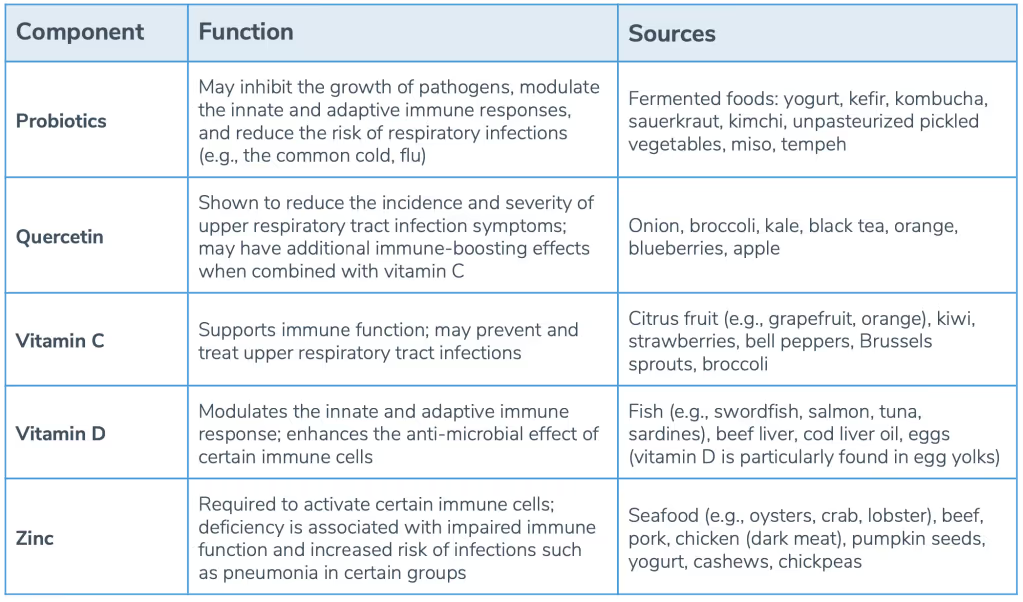4 Easy Ways to Boost your Immune System

Summary: Did you know you’re more likely to get sick in the winter? Learn why this is the case and discover 4 easy ways you can boost your immune system.
The information provided in this post is not a substitute for professional medical advice or treatment for specific medical conditions. You should not use this information to diagnose or treat a health problem without consulting a qualified healthcare provider. Links throughout this blog may also contain affiliate links. Please be assured, that these are all products I personally use and/or recommend. There is no additional cost to you, and often times when you use my link, you will save money with my exclusive discounts and coupons.
Have you looked around lately and thought- wow, EVERYONE is sick?! Well, you’re not alone. And you aren’t making it up. Whether it’s a cold, the flu, or something else, statistics would back you up. More people get sick during the winter months of the year.
Why are more people sick in the winter?
The question is why do more people get sick in the colder months? There are a few reasons for this:
1. Weather Change
Most viruses, like the cold or flu, enter our body through the nose. The nasal passage is lined with cells, hairs, and mucous that help trap viruses when they enter the body. Trapping these bugs/viruses in this way prevents them from infecting you. During colder weather, this process is less effective. Which means that the body has a harder time preventing viruses/bugs from infecting you.
Moral of the story- colder weather makes it more likely that you’ll be sick if you come in contact with a virus or flu bug.

2. Less Time Outside
I don’t know about you but I don’t LOVE being outside in frigid temperatures. I also know that it’s a lot harder getting outside when our hours of daylight are shorter. There are two problems with this. First, we need sun exposure for our bodies to make Vitamin D, which is important for a lot of functions in the body, but especially for the immune system. With less sun exposure and less Vitamin D, research shows that the immune system is less powerful and effective.
The other problem with getting outside less is that we spend more time indoors breathing in recycled air. One of the things I’ve done to minimize this both at home and at the office is to start using an air filter. I am loving my Molekule filter and the technology behind it. If you’re looking for an air filter for your home or workspace, I can’t recommend Molekule enough.
3. Sugar Sugar...
We just came out of/ might still be in the biggest sugar consumption time of year. From Halloween to Valentines day it seems there is always something going on and/or something to be eating that’s out of our norm. And, I believe that’s OK. If you’re like me and live in the midwest, the weather this time of year is dreadful at best, so a sweet here and there to cheer you up, isn’t going to kill ya! But it is important to note that sugar and processed foods are very inflammatory for the body. And inflammation makes it harder for the body to do its job.

I bet you could guess, but sugar also makes it harder for the immune system to function at its best. I won’t sit here and tell you not to eat the dessert or treat your self (I’m all for intuitive eating), but be aware of your sugar and processed food consumption. Eating foods high in sugar or those that come pre-packaged can negatively impact the health and function of the body, including the immune system.
With these three compounding factors, the health of the immune system tends to dip in the winter months and makes being sick much more likely.
4 Ways to Stay Well
So now that we know why more people get sick in the winter months, let’s talk about 4 things you can do to boost your immune system. Because prevention is Key! These tips are things that can be done all year long- not just in the winter months.
1. Sleep
Studies show that people who don’t get enough good quality sleep are more likely to show symptoms of being sick than those who get good sleep. Sleep is a natural physiological process that allows the brain and body to recover. Without adequate sleep the bodies ability to heal and recover is jeopardized. Prioritizing good sleep sets the body up for success. Sleep helps the immune system recover so that it can fight off the bugs in the environment and prevent symptoms of sickness. Getting enough good quality sleep will help the body recover faster if there are signs/sympomts of sickness as well.
2. Diet & Supplements
This is the simplest advice- eat real food. You don’t need a fancy diet or a meal plan to follow. Limiting the processed foods and added sugars that are consume will go a LONG way. Prioritize foods that are grown in the grown and not found in packages. Consider taking the time to make your own condiments and sauces rather than buying the pre-made options. The more real food you’re eating, often the less junk and inflammation that goes into your body. If navigating real food seems overwhelming, check out what we have in our pantry for some ideas, and download our grocery shopping + meal prep workbook from the Resource Library to help get you started.
If you’re looking to support your diet with supplements there are a few key players that help immune support. Those include probiotics, quercetin, vitamin C, vitamin D and zinc. You can read more about those in the table below.

3. Move your Body
Movement is what brings blood flow to all of the organs, tissues and cells of your body. And blood flow is what bring nutrients to your body. Regular movement is important for the overall health of the body, including the immune system. Too much movement however, can harm the bodies immune system. Strenuous physical activity is stressful for the body. We’ll talk about stress in just a moment, but when the body is in a state of stress, it cannot function at it’s best. There is some research to show that too much strenuous exercise may actually increase your risk of getting sick. So remember to move your body, but don’t overdo it.

4. Stress Management
Long term stress has been shown to decrease immune cell count and increase inflammation, which makes the immune system less powerful. Adding in stress management strategies into your lifestyle can be a simple way to boost your immune system. Consider setting boundaries or adding journaling and meditation to your routine to help you manage your stress. Check out the Free Resource Library for guides to help you with your stress management.
There are LOTS of things you can do to boost your immune system and prevent yourself from getting sick. But I’m here for keeping it simple. Start by doing the easy stuff- prioritize sleep, eat a good diet, take supplements when you can, move your body, and keep your stress low. The benefits of doing those simple things will go far beyond just boosting your immune system. You’ll likely feel more energized, more productive, and more like yourself too!
Try these simple tips and let me know if you find benefit from making these easy lifestyle changes.
Let's Get You Moving Better
You don't have to keep dealing with pain, plateaus, or disconnected care. Book your evaluation and let our team show you what whole-body care can do.

